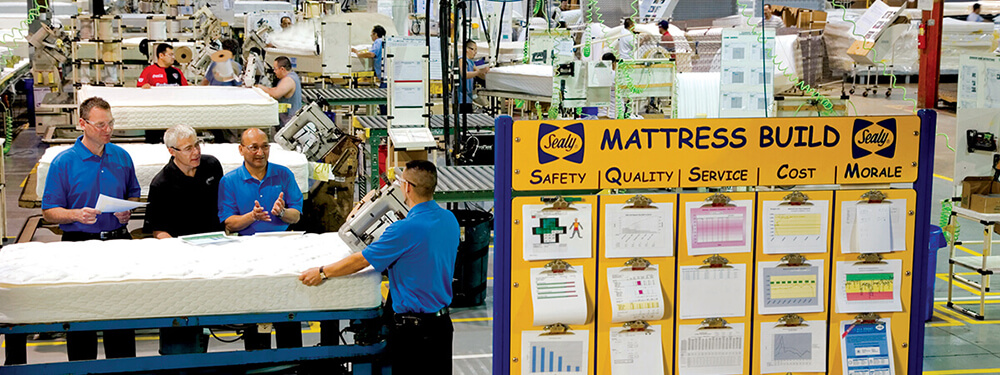Sealy Mattress defends its #1 market share position through lean transformation. They were able to avoid migration to low-cost manufacturing regions by increasing flexibility and supply chain responsiveness through mixed-model production.
Awash in a “sea of sameness,” Sealy needed to break away from the pack and offer customers improved products at better prices. But while many of their competitors saw China as the low-cost solution, Sealy chose to stay in the U.S. and transform their way of working. Along the way, they reduced inventory, freed-up cash, improved their short and long-term strategic plans, and gained important new insight into their business.
“Keeping production in the U.S. isn’t only patriotic, it’s fundamental to our business strategy..”
Sealy began their LeanSigma® transformation in a strong position, as the world’s largest bedding manufacturer, holding the number one U.S. market share for over 20 years. However, their 26 factories in North America were typical of the entire industry — inefficient batch and queue piece-rate production with mountains of inventory.
"If you walk through any of our customers' warehouses", says Sealy's Mike Hoffmann, Executive Vice President of Operations for North America, "you'll see that over half their inventory says 'made in China'. We could have jumped on that bandwagon, but felt that we could build a far more powerful responsive supply chain model with TBM's help."
Challenge: Private equity-owned mattress manufacturer needed to maintain a competitive position and avoid migration to low-cost manufacturing regions.
"So far, we've cut total inventory 62%", states Shailesh Patel. "For a business our size, a one-day reduction equates to about $1.5 million in freed-up cash."
A focus on using LeanSigma principles, Kaizen events, and Managing for Daily Improvement (MDI) to drive rapid improvement and culture change has been a hallmark of Sealy’s initiative. All critical metrics are posted on shop floor SQSCM boards (Safety, Quality, Service, Cost, Morale), as part of the MDI discipline.
Solution: Implement an enterprise-wide lean transformation and culture in 26 factories. Install a lean management system and create regional capability for building and shipping customized products within 48-72 hours without building any finished goods inventory.
Asked how lean and MDI have changed his environment, one longtime Sealy supervisor replied, “A year ago, if you had asked me how we were doing at any given point, I couldn’t tell you. Now I know."
"Our regional manufacturing strategy is about improving the workplace, encouraging innovation — and producing great products close to our customers,” adds Mike. “We’re using lean to drive standardization and eliminate waste throughout our supply chain, with TBM as our trainer and catalyst. We have lots of work ahead of us, but we’ll only become more competitive as our journey continues.”

